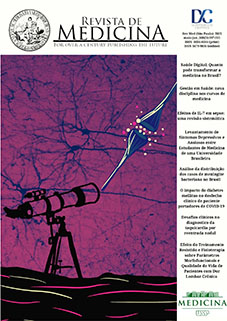Effects of IL-7 on sepsis: a systematic review
DOI:
https://doi.org/10.11606/issn.1679-9836.v100i3p254-268Palavras-chave:
Sepse, Interleucina-7, IL-7Resumo
Objective: The aim of this systematic review to evaluate the effects and possible therapeutic relevance of interleukin-7, a novel immunoadjuvant agent, against sepsis. Data Sources: We have searched PubMed, Scopus, LILACS and SciELO for any study which had IL-7 as intervention for sepsis. Study Selection: For each source, a single author was chosen to select all studies based on title and abstract. The remaining two authors then proceeded to read the complete text for relevance assessment. Results: Eleven sources were retrieved, consisting of six studies performed on animals, four on ex vivo human cells, and a single clinical trial. Several parameters were evaluated and reported, such as improved animal survival (3 trials; n= 264); improved cell count, activation, cytokine secretion, proliferation and survival; and higher patient CD4+ and CD8+ lymphocyte count (1 trial; n= 27). Major limitations were the heterogeneity of studies and the complexity of sepsis presentation. Data Extraction: Any data related to IL-7 intervention in septic patients was extracted. Animal and in vitro data was chosen according to outcomes in either overall survival or immune response markers. The data extraction from each study was conducted by a single author and then revised by the other two. Bias was assessed by all three authors together, without any specific methodology. Conclusions: Although IL-7 as a potential therapy option for sepsis still requires further investigation and clinical evaluation, current studies show promising results of how the interleukin could act against the disorder.
Downloads
Referências
Singer M, Deutschman CS, Seymour CW, Shankar-Hari M, Annane D, Bauer M, et al. The Third International Consensus Definitions for Sepsis and Septic Shock (Sepsis-3). JAMA. 2016;315(8):801-10. doi:10.1001/jama.2016.0287.
Delano MJ, Ward PA. Sepsis-induced immune dysfunction: can immune therapies reduce mortality? J Clin Invest. 2016;126(1):23-31. doi: 10.1172/JCI82224.
Patil NK, Bohannon JK, Sherwood ER. Immunotherapy: a promising approach to reverse sepsis-induced immunosuppression. Pharmacol Res. 2016;111:688-702. doi: 10.1016/j.phrs.2016.07.019.
Tang BM, Huang SJ, McLean AS. Genome-wide transcription profiling of human sepsis: a systematic review. Crit Care. 2010;14(6):R237. doi: 10.1186/cc9392.
Marshall JC. Why have clinical trials in sepsis failed? Trends Mol Med. 2014;20(4):195-203. doi: 10.1016/j.molmed.2014.01.007.
Hotchkiss RS, Monneret G, Payen D. Sepsis-induced immunosuppression: from cellular dysfunctions to immunotherapy. Nat Rev Immunol. 2013;13(12):862-74. doi: 10.1038/nri3552.
Boomer JS, Green JM, Hotchkiss RS. The changing immune system in sepsis: is individualized immuno-modulatory therapy the answer? Virulence. 2014;5(1):45-56. doi: 10.4161/viru.26516.
Mackall CL, Fry TJ, Gress RE. Harnessing the biology of IL-7 for therapeutic application. Nat Rev Immunol. 2011;11(5):330-42. doi: 10.1038/nri2970.
Francois B, Jeannet R, Daix T, Walton AH, Shotwell MS, Unsinger J, et al. Interleukin-7 restores lymphocytes in septic shock: the IRIS-7 randomized clinical trial. JCI Insight. 2018;3(5). doi: 10.1172/jci.insight.98960.
Unsinger J, McGlynn M, Kasten KR, Hoekzema AS, Watanabe E, Muenzer JT, et al. IL-7 promotes T cell viability, trafficking, and functionality and improves survival in sepsis. J Immunol. 2010;184(7):3768-79. doi: 10.4049/jimmunol.0903151.
Kasten KR, Prakash PS, Unsinger J, Goetzman HS, England LG, Cave CM, et al. Interleukin-7 (IL-7) treatment accelerates neutrophil recruitment through gamma delta T-cell IL-17 production in a murine model of sepsis. Infect Immun. 2010;78(11):4714-22. doi: 10.1128/IAI.00456-10.
Unsinger J, Burnham CA, McDonough J, Morre M, Prakash PS, Caldwell CC, et al. Interleukin-7 ameliorates immune dysfunction and improves survival in a 2-hit model of fungal sepsis. J Infect Dis. 2012;206(4):606-16. doi: 10.1093/infdis/jis383.
Shindo Y, Unsinger J, Burnham CA, Green JM, Hotchkiss RS. Interleukin-7 and anti-programmed cell death 1 antibody have differing effects to reverse sepsis-induced immunosuppression. Shock. 2015;43(4):334-43. doi: 10.1097/SHK.0000000000000317.
Shindo Y, Fuchs AG, Davis CG, Eitas T, Unsinger J, Burnham CD, et al. Interleukin 7 immunotherapy improves host immunity and survival in a two-hit model of Pseudomonas aeruginosa pneumonia. J Leukoc Biol. 2017;101(2):543-54. doi: 10.1189/jlb.4A1215-581R.
Kulkarni U, Herrmenau C, Win SJ, Bauer M, Kamradt T. IL-7 treatment augments and prolongs sepsis-induced expansion of IL-10-producing B lymphocytes and myeloid-derived suppressor cells. PLoS One. 2018;13(2):e0192304. doi: 10.1371/journal.pone.0192304.
Venet F, Foray AP, Villars-Mechin A, Malcus C, Poitevin-Later F, Lepape A, et al. IL-7 restores lymphocyte functions in septic patients. J Immunol. 2012;189(10):5073-81. doi: 10.1172/jci.insight.98960.
Demaret J, Dupont G, Venet F, Friggeri A, Lepape A, Rimmele T, et al. STAT5 phosphorylation in T cell subsets from septic patients in response to recombinant human interleukin-7: a pilot study. J Leukoc Biol. 2015;97(4):791-6. doi: 10.1189/jlb.5AB1114-545R.
Venet F, Demaret J, Blaise BJ, Rouget C, Girardot T, Idealisoa E, et al. IL-7 Restores T Lymphocyte Immunometabolic Failure in Septic Shock Patients through mTOR Activation. J Immunol. 2017;199(5):1606-15. doi: 10.4049/jimmunol.1700127.
Thampy LK, Remy KE, Walton AH, Hong Z, Liu K, Liu R, et al. Restoration of T Cell function in multi-drug resistant bacterial sepsis after interleukin-7, anti-PD-L1, and OX-40 administration. PLoS One. 2018;13(6):e0199497. doi: 10.1371/journal.pone.0199497.
Drewry AM, Samra N, Skrupky LP, Fuller BM, Compton SM, Hotchkiss RS. Persistent lymphopenia after diagnosis of sepsis predicts mortality. Shock. 2014;42(5):383-91. doi: 10.1097/SHK.0000000000000234.
Sereti I, Estes JD, Thompson WL, Morcock DR, Fischl MA, Croughs T, et al. Decreases in colonic and systemic inflammation in chronic HIV infection after IL-7 administration. PLoS Pathog. 2014;10(1):e1003890. doi: 10.1371/journal.ppat.1003890.
Sportès C, Hakim FT, Memon SA, Zhang H, Chua KS, Brown MR, et al. Administration of rhIL-7 in humans increases in vivo TCR repertoire diversity by preferential expansion of naive T cell subsets. J Exp Med. 2008;205(7):1701-14. doi: 10.1084/jem.20071681.
Downloads
Publicado
Edição
Seção
Licença
Direitos autorais (c) 2021 Filipe Oto Cunha de Moraes, Guilherme Tetsuo Yokoy Numakura, Larissa Tami Hokama, Francisco Garcia Soriano

Este trabalho está licenciado sob uma licença Creative Commons Attribution-ShareAlike 4.0 International License.




